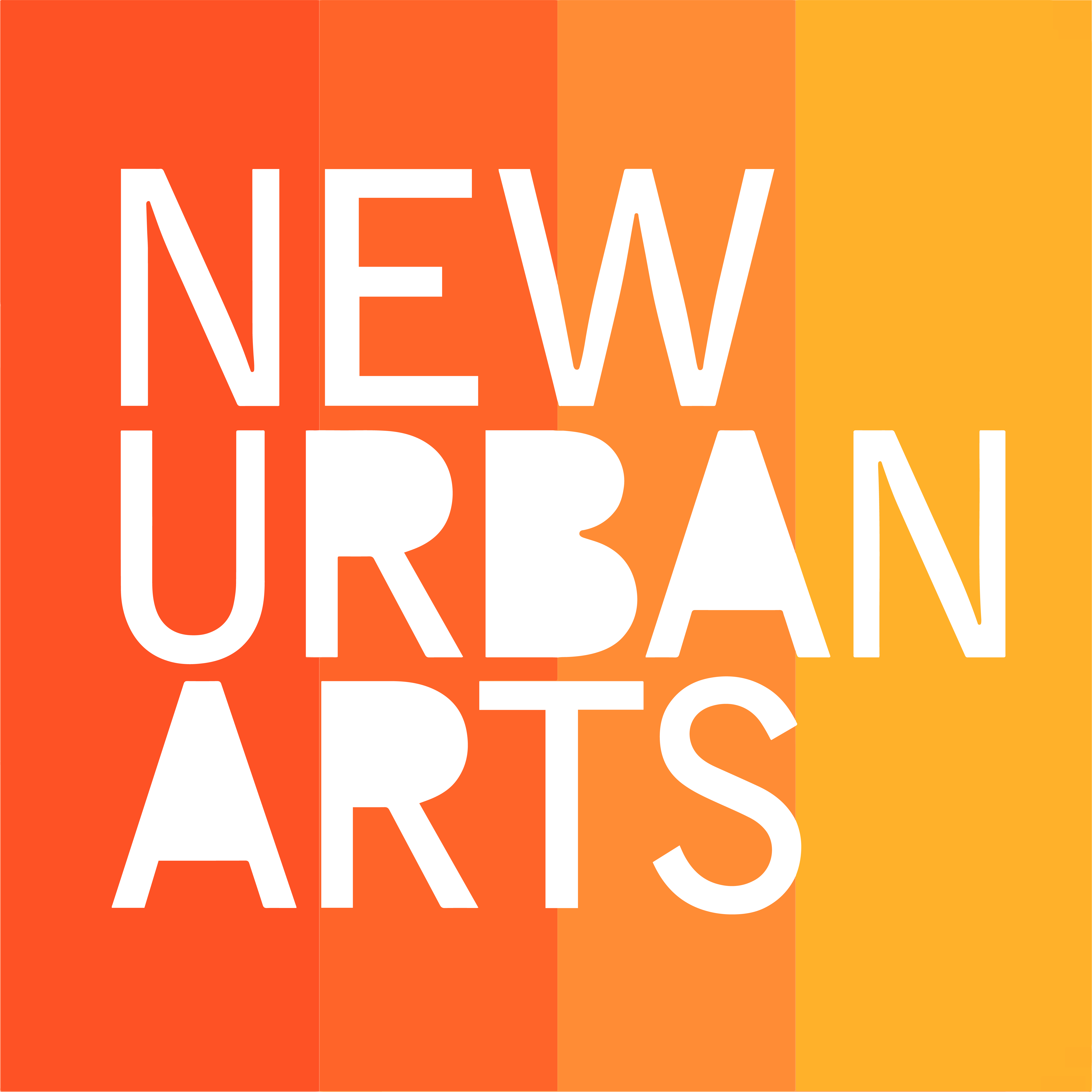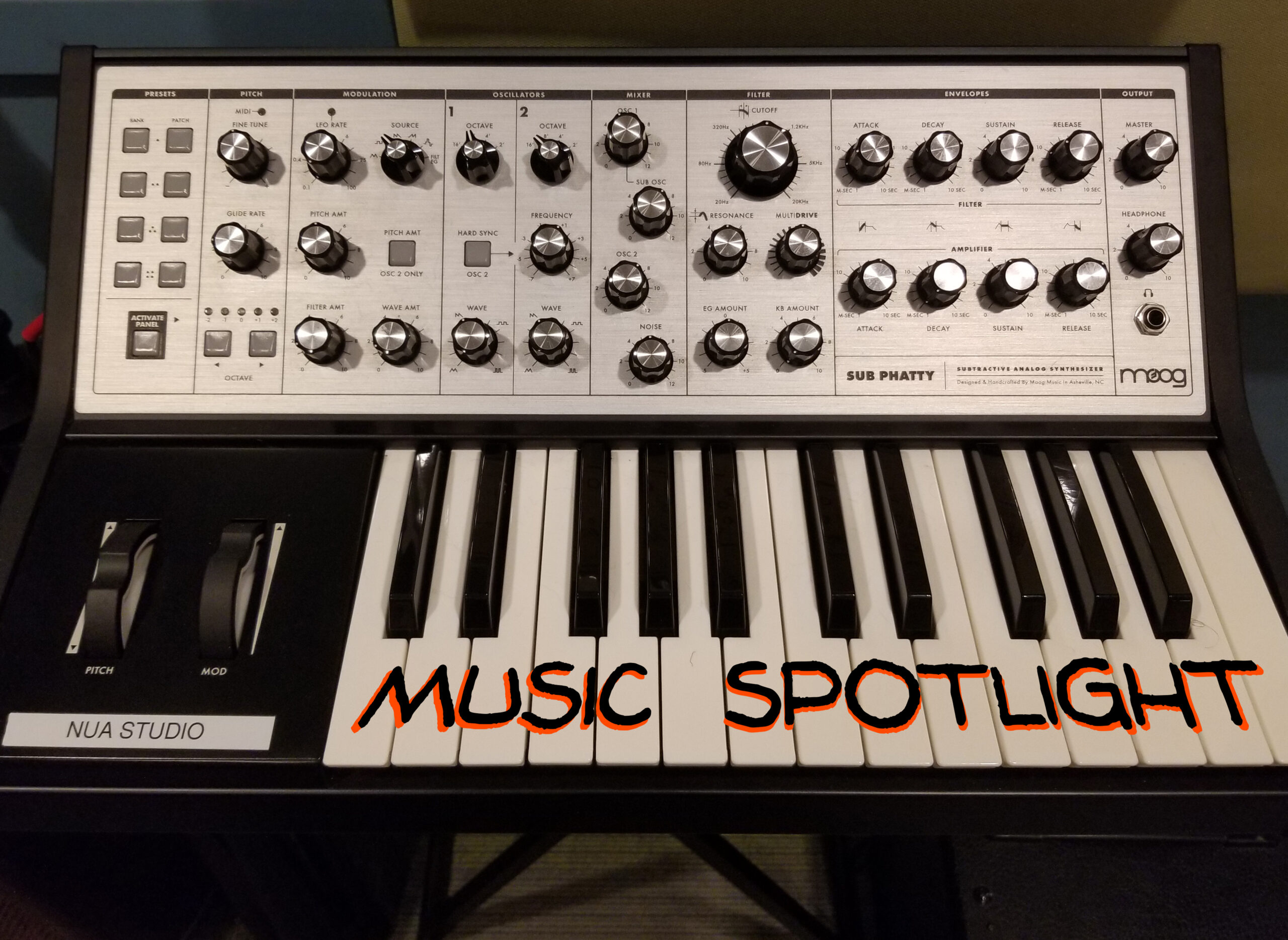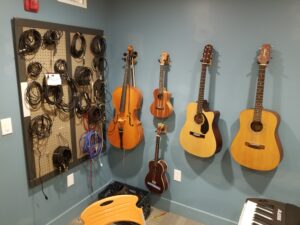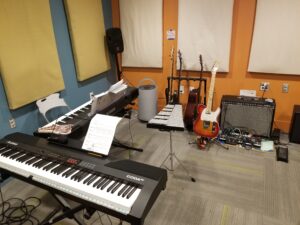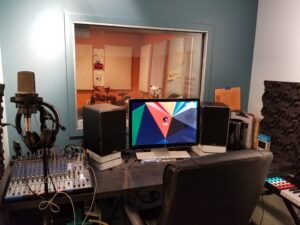As part of New Urban Art’s 25th Anniversary, we will be spotlighting current programs and initiatives across the organization. For our sixth month, we are highlighting our Music program with an interview with our Music Resident Artist Mentor, Andres Bonilla, who started his first year at NUA this last fall, in 2021.
This was your first year at NUA. How’s it feel in the music room? What has been surprising?
Andres: It was very surprising the environment, the vibe. I used to be a professor, there were specific hours, a schedule, but here it is an open studio. That was very surprising – to be in a space that I could be with the students in a different way every single day.
The other thing that shocked me from the beginning was the number of different instruments we have – the synthesizers, the drums, the guitar pedals, the MIDI controllers, it’s awesome. It gives us a lot of opportunities to create, we don’t have the usual limitations, it’s not just one guitar, we have 3, and 3 amplifiers!
Why do you think music is important to students and the studio?
Andres: I think that music is one artform that you used to do with more people. It’s not like writing, for example: usually you write, you paint alone, not always, but often that’s the culture. Music is one where, yes you can do it alone, but usually you need more people to create your music – you need a bass player, a singer, a drummer, it’s a social activity. In the studio, it’s the most social activity. The students that play music in the studio, they work together and they stick together. You can spot them in the rest of the studio because they cluster together with each other–not because they are jerks, but because they learn and express together and it makes them close. I think it’s important to have that space. Sometimes music can be a way to overcome loneliness.
I know that you weren’t here pre-covid, but do you think that loneliness is more pronounced, are students more hesitant to play together now in the pandemic era?
Andres: My feeling when I arrived here was that the students were very isolated, each one in their own space creating their own thing. It was cool to see how the desire to make music made them socialize with others slowly. The desire to create music was stronger than their anxieties. Making music was the path and the tool at the same time: they wanted to play together to create music and so they were socializing and then creating music together. A lot of them came in with their own ideas, but I think they all slowly realized that they needed others to make music and a lot of friendships came out of it.
What is your background in music? What do you think you bring to the music programs at NUA?
Andres: I started to play when I was 13 years old, but my family always played guitars and folk instruments, so I have this Latin American, Colombian, folk background in one hand, and then eventually I picked up electric guitar and started playing Pink Floyd and Metallica and stuff. Then I went to university and studied jazz, salsa, a lot of classical of course. And then I went to Italy to study film scoring and I had this amazing experience that allowed me to compare my Colombian background against a European one. I brought something different than the other students and it helped me reconsider my own work in a new way that I am still exploring, the overlap of those two cultures. That is also what I bring to NUA, my background as an immigrant, as a Latin American musician. At NUA it’s cool, there’s all this diversity and it’s important for the students to see someone who is not from here, for our immigrant students as well, to help them see they can draw from their own cultures as well, whatever they are.
What are your hopes for music going forward (immediate future)?
Andres: There are some people who seem interested in pursuing a career in music. I want to help them achieve their goals, going to university for composition or learning how to produce their own songs. This last year felt more like an opener: people came here for the first time since the pandemic and they had to figure out how to use the space. Now that they have seen the studio, some of them want to develop more of their own projects. I always love helping people get started with a new instrument and am looking for new tools to assist with that, maybe host some writing or production workshops, etc.
What are your dreams for music at NUA over the next 25 years (long term/fantasy)?
Andres: I would like there to be different options for mentors within music, a violin mentor, a drum mentor, a cello mentor, with different rooms, and to start working with kids who are maybe a little bit younger since it really helps so much to start with an instrument and then maybe have a festival! There could be so many different kinds of music it would be great.
Any tips/words for students who have never tried music at NUA?
Andres: It’s important to know that talent is just the art of repetition. There is not some magical formula. Music has this particular quality, it is one of the most performatic arts. When someone is playing you see that instant, those two minutes. You think ‘Wow, that person is awesome, so talented, I could not do something so hard,’ but that person was practicing in their room for who knows how many hours per day. Just for fun. If you want to try, if you want to play some music, don’t worry about whether or not it’s good. Expose yourself to new things, ask around for help, play, and don’t worry. This is especially true for singers, people think ‘I don’t have a good voice,’ but that’s an instrument that can be practiced too. There’s also making music on the computer, where you don’t have to be an amazing instrumentalist. It’s another way of expressing yourself that is available now, that anyone can take advantage of.
